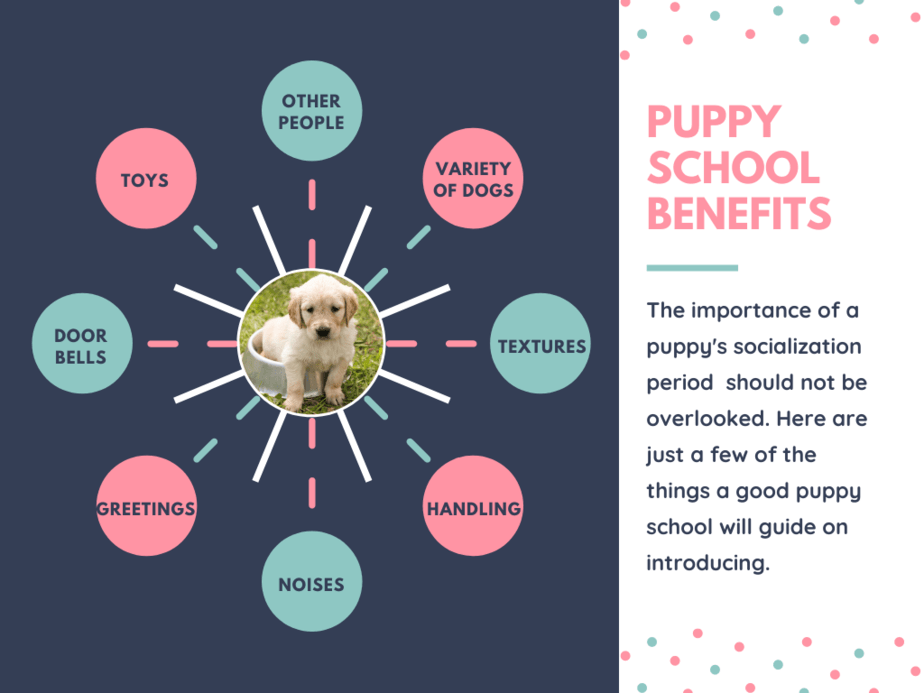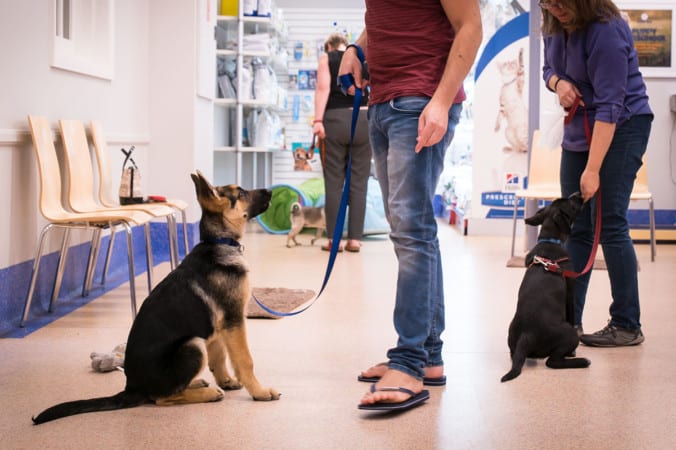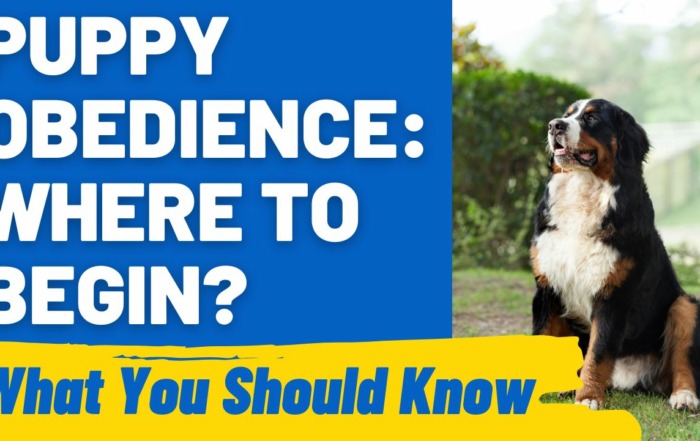As soon as we get our little, furry bundles of joy home, most people wonder if their puppy should start classes. We want to jump right in to make sure we raise a furry little Einstein, but there are choices to be made. Such as do you send them to puppy school, or obedience classes, and is there a difference?
Just like you wouldn’t drop your toddler off at college just because he is smart, you want to make sure to enroll your puppy in a class that will lay the foundation for future success.
What is the difference between puppy school and obedience class?
Puppy school is a foundation school, vital for young dogs going through the critical socialization period in their first 8 to 14-weeks. If they miss out on this socialization window, which begins to close after 14-weeks, it can dramatically affect their behavior for the rest of their lives.
Obedience classes come after puppy school, and although there is a socialization element to the training, it focuses on basic training, progressing to more advanced training commands, and also setting some foundation behaviors.
If you’re considering taking your puppy to Petco or PetSmart for their training or school, be sure to read our post: PetSmart VS Petco: Training Comparison
At what age should puppies go to puppy school?
Puppies should start puppy school between 8-10 weeks. Many owners worry that their puppy is not fully vaccinated. The American Veterinary Society of Animal Behavior (AVSAB) recommends starting before the puppy series of vaccinations is complete, but to be sure your puppy has had at least their first set of vaccines, seven days prior to starting class.
The AVSAB makes this recommendation because, “Behavioral issues, not infectious diseases, are the number one cause of death for dogs under three years of age.” You can read their full position here.
You do want to be sure that all of the other puppies in class have also had their first round of vaccines and have been seen by a vet – however, a good puppy school will be requiring this beforehand, and it’s best to ask when booking your puppy in.
At what age should puppies go to obedience classes?
By 10 to 12-weeks of age, a puppy will be ready for obedience training classes. This will occur after a puppy has completed puppy school. The social exercise done in puppy school will help lay the foundation for success in an obedience class, where they can begin basic training commands, and progress from there in their training.
Is puppy school worth it?
Yes, puppy school is vital for setting a dog up for success. The critical socialization window begins to close after 14-weeks of age, so it’s vital a puppy engages in as much social activity as possible during this time. Puppy school enables them to interact with other puppies and smells and teaches owners how to raise a happy puppy.
I have been a dog training instructor for 20 years, and I often tell people if they can only afford one class with their dog, make it puppy school. In the first 3-4 months, we can do SO much to help raise a more confident dog.
If you have a shy puppy, a qualified instructor can help develop a plan to build more confidence. We can almost always have more impact on a puppy and help them ease fears at a younger age.
Long story short: There are so many exercises we can do with a puppy that will make life less scary. And that includes conditioning them to nail trims, grooming, and even behaviors that will make vet visits less scary. So please go to puppy school!

Are puppy obedience classes worth it?
Yes, as long as you make the socialization and confidence-building that comes from the preceding puppy school a priority, and not just make obedience your main focus.
Obedience can and should be the next step after puppy school. Not only are obedience skills helpful for management, but training is also great enrichment for your puppy, and can help reduce unwanted behaviors.
And while it is true that when using the right techniques, a puppy can learn a large number of obedience skills, they truly can learn those at any age. So a class that focuses on socialization and enrichment should be prioritized over obedience because the socialization period is limited.
How much does puppy school cost?
Puppy school costs $50 per hour on average. This will depend on your location and the demand. Often puppy schools will offer packages that include obedience classes for an additional fee, and there are also boarding school options, which will cost more but include training.
How much do puppy obedience classes cost?
The average national cost of an obedience class is $50 per hour. Classes can go from 4 to 6-weeks, with an hour of training per week. The cost will vary depending on where you live and how many training schools are in your area, as demand can impact the cost.

What will my puppy learn at puppy school?
The focus of puppy school is socialization. So there should be some free play time, where your puppy will learn how to interact with a variety of breeds, and a variety of temperaments.
The instructor monitors all interactions, and will often narrate what the puppies are doing, so you, as an owner, can learn how to help your puppy have successful social interactions outside of class.
In addition, your puppy should have the opportunity to interact with the other human students in the class. Exposure to different types of people is key to helping your puppy be confident with novel humans they meet in the future.
But socialization also includes environmental conditioning. They need to learn how to navigate situations that look different, so if they come across something as an adult they will know how to navigate it.
Most people don’t realize how important that is. I foster retired racing greyhounds, who usually come from sterile environments, and they often have a hard time learning stairs and doorwalls. This is because many of them are not exposed to a large number of varying environments as puppies.
So for instance, in my puppy school class, we use tunnels, a balance board, a skateboard, just to name a few! We expose them in a way that is fun and rewarding so they learn that navigating something novel is fun.
Puppy school should also teach the human end of the leash how to expose their puppies to different sounds, so we can work toward getting the puppies used to noises that might startle them.
Some puppy schools will also start to lay a solid foundation for obedience, but it is not the main focus.
Other subjects that may be covered in puppy school include:
- Toilet training
- Crate training
- What puppy’s can and can’t eat
- Settling into a new home
- Introducing basic manners
- Preparing for family life
- Understanding dog behavior
- Behaving calmly
What will my puppy learn at obedience training?
A puppy obedience class will focus on building solid basics. Sits, downs, leash training, and coming when called are the foundational behaviors that should be covered.
So often people want their puppies to do more advanced behaviors, but listen to your instructor to perfect these very basics, and you will be able to more easily build on them down the line.
For instance, don’t worry about a perfect heel, the first step is making sure your dog is comfortable on a leash.
Working around other dogs and people (the other students) means working around distractions. Don’t get frustrated if your dog doesn’t respond to obedience cues like they do at home. This is an opportunity to build a response amongst distractions.
Many puppy obedience classes will also teach skills that are useful for grooming and healthcare, such as a side-settle or a chin rest.
Some of the lessons that may be covered include:
- Basic training commands
- Troubleshooting problem behaviors
- Remaining calm amongst distraction
- Lifelong training habits
- Learning manners at home and out in the world
- Possible clicker training (depending on instructor’s training techniques)
How to choose the right puppy school or obedience class?
Even more important than choosing between puppy school or obedience school is finding a training staff that knows what they are doing. No matter what class they are teaching, if a skilled trainer believes your dog needs more socialization, they will suggest it, which is vital feedback.
Most dog trainers will allow you to sit in on a class to make sure it is the right fit for you. Methods matter too. I suggest finding a positive reinforcement-based trainer. Here is another handout courtesy of the AVSAB on how to find a trainer.
Another interesting option for puppies that is increasing in popularity is puppy schools holding classes at veterinary clinics. This is a great opportunity for your puppy to have fun, positive interactions at their vet clinic, which can help them feel better about going to the clinic in the future.
You can find a Fear Free Vet clinic or professional here that may offer this type of opportunity.
Final Word
Many times I have talked with people who were anxious to jump right into obedience. They believed that they have supplied enough socialization at home. But I caution you to not underestimate how much positive exposure a puppy needs.
Siblings don’t count. Most people interact differently with their siblings than people they meet at work or on the street. This is what we are trying to teach our dogs. How to meet a novel dog while decreasing the risk of conflict.
My youngest dog is a chihuahua. Since she was a puppy, she interacted beautifully with our older German Shepherd Dog. So I was surprised during her first socialization class that she was slow to warm up. So I am glad we decided to focus on socialization, even though I was doing my best to check all of the boxes in our work with her at home.
And as she got more comfortable around other dogs, she was able to focus more when we worked on obedience in her puppy obedience class.
Recall Training Secrets: How to Teach Your Dog Reliable Recall
Teaching a dog recall is not just a basic obedience skill; it's a vital aspect of ensuring the safety and freedom of your beloved pet. Picture this: your dog is playfully chasing after a squirrel [...]
The Joy of Petting: How to Approach Dogs the Right Way
"Can I pet that dog?" is often the first thought that pops into our minds when we see a furry friend wagging its tail. The joy of petting a dog is unmatched, offering both the [...]
Puppy Obedience: Where to Begin? An Introductory Guide
Puppy obedience is more than just teaching commands. It's about nurturing a relationship based on mutual respect and understanding. It lays the foundation for a well-behaved adult dog and ensures a harmonious life together. In [...]
Understanding Canine Autism: Do Dogs Experience It?
Have you ever wondered, can dogs have autism? Autism, a complex condition often characterized by social and communication difficulties, is widely recognized in humans. But when it comes to our canine companions, the idea of [...]








